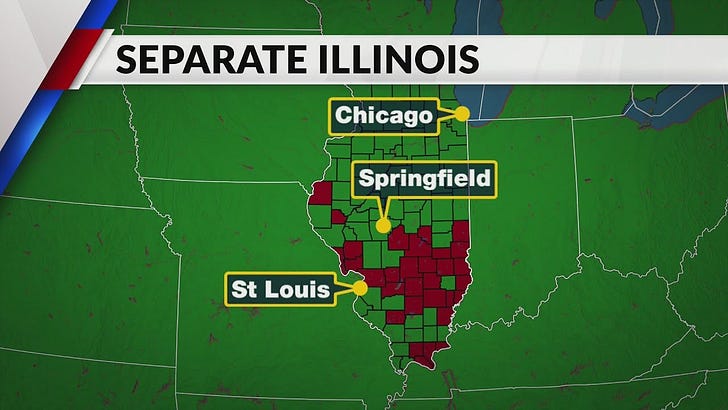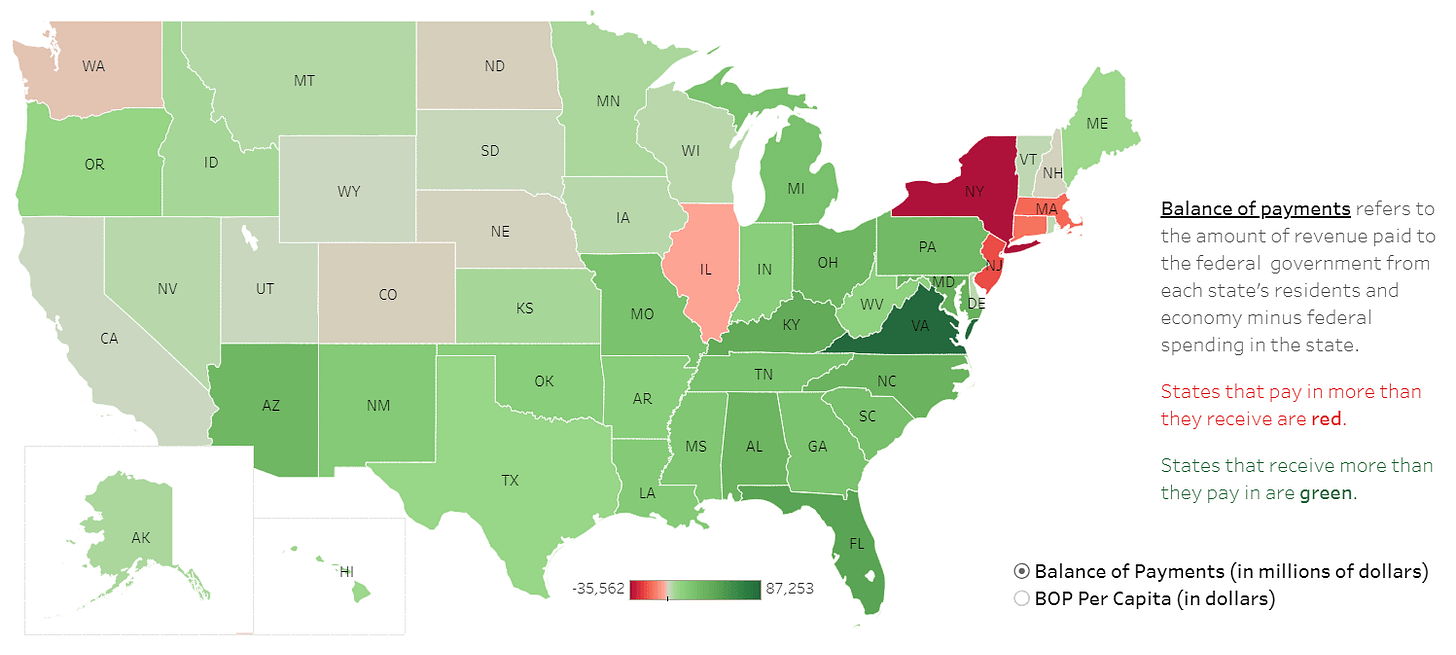Welcome to a Tuesday edition of Progress Report.
The ongoing national implosion triggered by Donald Trump and Elon Musk has had me thinking about how states are both extremely vulnerable to the whims of ideological madmen as well as more powerful than they may realize. With some very unusual news coming out of Indiana, tonight is the perfect time to discuss a topic that I have no doubt has floated through your mind over the past month.
I’ll have a national, state, and local news round-up for paid subscribers tomorrow — by the way we need just 35 more paid subscribers, to get us over a gigantic milestone and into a new echelon here on Substack that will really allow this newsletter and community to grow. So think about joining, OK? Thanks!
Note: This is a fully independent newsletter — no ads, no sponsors, no politicians able to apply pressure or influence what we cover and write. Progress Report relies entirely on readers and supporters willing to fund independent journalism and political thought.
This election showed that progressives desperately need to build up their own alternative political media infrastructure, and for just $5 a month, you can help keep us afloat and build the movement.
An Indiana legislative subcommittee voted on Monday to establish a commission that will examine the feasibility of annexing large swaths of rural Illinois. The new Indiana-Illinois Boundary Adjustment Commission is the latest in a growing list of attempts to encourage interstate secession, but this one comes with a twist: Instead of denouncing the idea as a conservative fantasy or GOP power grab, all but one Democrats voted for the idea.
"I hope that possibly this is a two-way street," Indiana state Rep. Ragen Hatcher told the local IndyStar. "Maybe this is a start for everyone."
With Illinois’s government long dominated by Democrats from Cook County and greater Chicagoland, Republicans from downstate have increasingly sought to formally break away. Since 2020, a total of 33 counties have voted to create commissions to explore the possibility of secession from Illinois, including seven in November.
A nonprofit called New Illinois has become a leader of the secession movement, advocating first and foremost for the establishment of a new state. In the event that becoming the 51st state is off the table — and the process more or less means exactly that — then joining Indiana has been acknowledged by some in the movement as the second-best option. Activists have also discussed the possibility of joining Missouri and Kentucky.
The legislatures of both states would have to vote to approve the switch, as would Congress. For Illinois, there’d be little obvious incentive to wave goodbye to a third of its counties; with partisan power already consolidated, acceding to secession would cost the state tax revenue, federal funding, electoral votes, and at least one seat in Congress. Perhaps, as Rep. Hatcher alluded, there could be a trade of sorts, but that would take it from unprecedented territory to pure fantasy… or would it?
The state secession movement has gained steam in recent years alongside the rise of legislative supermajorities, a deepening political divide between urban and rural communities, and the mainstreaming of far-right ideologies built on obscure anti-government legal theories.
The “Greater Idaho Movement” has for years tried to cleave off rural parts of eastern Oregon to be absorbed by Idaho, with a number of counties having voted to make the switch, and it’s claiming new momentum once again.
Separatists in southern Oregon and Northern California have long sought to create their own state, which would be known as Jefferson, and conservative activists in rural Colorado have made overtures about joining Wyoming. Republican lawmakers in Maryland made noise about joining West Virginia in 2021.
I wouldn’t expect any of these movements to gain enough momentum to become actual possibilities anytime soon, but the idea of a national breakup doesn’t seem as preposterous as it did just a few years ago.
In 2023, the Brookings Institute looked at the growing movement of state separatists and lamented what it meant for national sociopolitical tolerance.
In many ways, those counties seeking to join politically similar states are merely taking the next step toward the ideological homogeneity that has been congealing in the United States for the past several decades, with each party’s vote share growing in counties and states where it already does well. Americans increasingly choose where they live based on the political lean of the area. Polarization can now be tracked in geographical terms.
It’s only become more pronounced since that was published.
There are few bonafide swing states anymore, and red state legislatures are becoming more extreme, in part because of population shifts during the pandemic, as alluded to above. States are increasingly taking aim at one another, whether that involves shipping hundreds of thousands of poor immigrants to northern cities without warning or trying to prosecute blue state doctors for assisting with abortion care. State attorneys general now regularly join together in partisan lawsuits that directly pit red vs. blue America, with enormous economic and environmental consequences.
The conservative Supreme Court has become a tool for cultural and political hegemony, bending novel legal theories to block Democratic presidents and blue state laws, including gun control and protections for vulnerable communities, while extending full monarchical powers to Republicans. With full control of government, Republicans are aiming to rip apart the social safety net, which would be cataclysmic for blue states that expanded Medicaid and rely on the federal funding.
Since the pandemic radicalized many Americans against even the most basic shreds of reality, I’ve said that I can’t imagine this country remaining in its current form for the long-haul. For centuries, the US has been bound by interstate commerce, tax money distribution, business interests, and mixed ideology within political parties. In taking a wrecking ball to the federal government. Trump and Elon Musk are also snapping the ties that bind the nation together.
They are also tempting fate: Republican plans to end federal support for Medicaid expansion or perhaps cut down on the overall program’s funding would have an outsized impact on states like New York and other Northeastern liberal stalwarts, which otherwise pay far more into federal taxes than they receive in grants and other spending.
Why continue that uneven exchange, especially if it no longer fuels things like scientific research, management of federal lands, or fair trade markets? Why submit to government agencies that make it harder to access vaccines and does away with education policy? Why honor court decrees that they can’t ban automatic weapons? Why cooperate when ordered to end congestion pricing? Why allow bigoted opportunists the right to end racial equity programs and prevent the teaching of Black history in schools?
The obvious answer is that Trump and Musk control federal funding and could block blue states at any time. But that’s already happening; the White House clawed back $80 million in FEMA aid that New York City intended to use on housing immigrants, while Trump threatened to put conditions on federal aid after the LA wildfires.
While I don’t think anything resembling a national secession has any chance of happening, at least not with the current generation of milquetoast Democratic leaders, it seems impossible for the country to continue on this trajectory.
Could blue states begin to ignore court orders and laws, the way Texas ignored the Supreme Court’s order for it to stop blocking the feds from accessing parts of the border? You could see them forming alliances to purchase vaccines and pharmaceuticals in bulk, provide access to reproductive or gender-affirming care, and create special trade laws, and provide help during disasters. Regional factions could find ways to govern together, based on coordinated changes to state constitutions.
Over time, we’d drift toward these relationships being the new normal, something that this country has shown itself to be very adept at doing.
Wait, Before You Leave!
Progress Report has raised over $7 million dollars for progressive candidates and causes, breaks national stories about corrupt politicians, and delivers incisive analysis, and goes deep into the grassroots.
None of the money we’ve raised for candidates and causes goes to producing this newsletter or all of the related projects we put out. In fact, it costs me money to do this. So, I need your help.
For just $5 a month, you can buy a premium subscription that includes:
Premium member-only newsletters with original reporting
Financing new projects and paying new reporters
Access to upcoming chats and live notes
You can also make a one-time donation to Progress Report’s GoFundMe campaign — doing so will earn you a shout-out in the next weekend edition of the newsletter!







You write: "While I don’t think anything resembling a national secession has any chance of happening..."
Consider this scenario:
Team Trump is plowing ahead to test the boundaries of their power. At some point it will clash with the judiciary. TT decides they can simply ignore court orders, judges being reluctant to actually go so far to issue arrest warrents - and what of it? - who is going to carry out an arrest anyway? The DOJ's US Marshals? Fat chance...
Along the way, TT will realize they actually don't ever need to relinquish power anymore. Fast forward 2028. States will nevertheless call the election, the GOP gets a beating, but then TT and the crony VP will simply declare the outcome invalid and simply stay put, ignoring the feeble protests. Again, who will evict them from the White House, with all agencies purged with bobbleheads instead at all levels?
At this point; when the Putin-ification of the USA is complete, what will the blue states do, when its finally, *Finally* apparant to these fuckers what the end-goal has always been?
I was thinking about it the other day, I bet there are more shared values and solidarity between the people of Croatia, Serbia, Slovenia and all the other ex-Yugoslavia countries that fought a war than between Republicans and the rest of mankind.